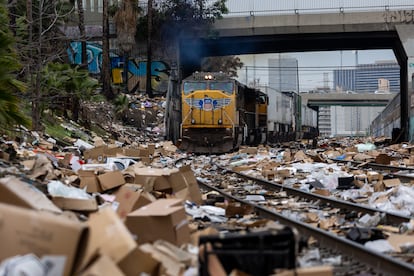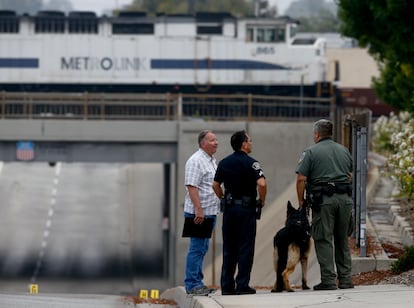Like outlaws from the Old West: Sinaloa Cartel accused of robbing US trains
Court documents reveal at least 10 heists in the last two years on the California-Arizona route


The image isn’t sepia or black and white. It’s not even from a movie — yet the story feels like an Old West film about outlaws. Over the past two years, criminal groups have boarded moving freight trains crossing the Arizona desert in the United States and have robbed them up to 10 times.
These outlaws don’t dress like cowboys, but they’re also after loot: Nike Air Jordan sneakers and electronics that, due to their value and volume stolen, can be as valuable gold. According to documents from an Arizona court, U.S. federal agents have seized around $2 million worth of goods believed to have been stolen from the Burlington Northern & Santa Fe (BNSF) freight railways. The main suspect, according to Washington, is the Sinaloa Cartel.
Complaints from agents of the Homeland Security Investigations (HSI), dating from August 2024 and January 2025, state that these groups carried out their criminal operation with extensive connections throughout California, Arizona, and New Mexico. The suspects — with the forewarning and complicity from associates working in warehouses or transport companies — targeted high-value containers on the BNSF railway line.
They took advantage of rail switches or train stops to board the cars. Once aboard, they sought out containers with visible high-security locks and used reciprocating electric saws or bolt cutters — which cut metal plates cold — to open the containers.

The suspects would cut the train’s air brake hose, causing an emergency stop. They would then unload the stolen goods and hide them in the nearby open fields or bushes along the tracks. Using cell phones, they alerted their associates about the location of the merchandise so it could be picked up immediately or later if security forces were nearby.
Meanwhile, a surveillance team followed the train on the road, waiting to learn the exact location of the stolen goods. Once confirmed, cargo trucks of various sizes and models collected the loot and transported it from Arizona to California for storage and resale on platforms like Amazon and eBay.
In this latest wave of train robberies, first reported by the Los Angeles Times, at least 10 heists have been recorded since March of last year, stealing an estimated $2 million worth of Nike shoes. As part of the investigation, tracking devices were installed in some containers. Thanks to this, on January 13, law enforcement intercepted the suspects in two vehicles carrying more than 1,900 pairs of sneakers that were not yet available on the market. The value exceeded $440,000.
One leader, many identities
Eleven Mexican nationals, some originally from Sinaloa, were arrested in the operation. Nine of them were residing illegally in the United States, and one had asylum status. According to authorities across the border, they are allegedly part of the criminal organization once led by Joaquín “El Chapo” Guzmán Loera. The indictment states that it is believed that these thefts are linked to an international criminal syndicate based in the Mexican state of Sinaloa.
Indiana Senator Todd Young said that during the arrest of these individuals, “investigators found ties to the Mexican cartel.” “Federal officials have linked this to a federal cartel operating in Sinaloa,” he stated.
Although the detainees had previously committed robberies, another HSI agent revealed that this particular style of BNSF train robbery was orchestrated by Arturo N., aka Pollo. He controlled these crews, providing vehicles for the heists and facilitating the sale of stolen goods. According to the charges, this man has been committing these crimes for 11 years.
HSI information shows that between February 2022 and June 2024, Pollo, under one of his three other aliases, transferred nearly $260,000 from the United States to Mexico via bank transactions.
On May 7, 2024 — more than a month before his arrest on June 20 — Los Angeles police installed a tracker on one of the cargo trucks that Arturo N. used to transport stolen merchandise. The device led them to an empty storage unit rented under one of his aliases.
A detective obtained a photo of the driver’s license used to rent the space. According to the image description, Pollo wore a cap with the letters “JGL” and the number “701” in the colors of the Mexican flag. This was a reference to El Chapo’s initials and his former position on Forbes’ billionaire list. An HSI agent indicated in the indictment that people who glamorize the narco lifestyle, like those associated with JGL 701, and the criminal networks linked to it, often engage in similar illegal activities.

This lead allowed authorities to issue search warrants for 11 houses and 16 storage units in California linked to the thefts. The operation resulted in the arrest of 43 people, the seizure of 41 vehicles, over 300 kilos of methamphetamine, and 17 firearms.
Moving beyond reactive diplomacy
In light of the sanctions, accusations, and allegations emerging from U.S. executive agencies amid the Trump administration’s declared war on drug trafficking and organized crime, Cecilia Farfán-Méndez, head of the North America Observatory at the Global Initiative Against Transnational Organized Crime, believes it is important to build on evidence and move away from reactive diplomacy.
The expert on organized crime in Mexico expresses concern about the argument that, due to decreased profits from migrant trafficking or the supposed increasing difficulty of fentanyl trafficking, criminal groups are seeking other sources of income. “We hear this frequently, but it’s not necessarily supported by evidence,” she explains via video call.
Within this context, she highlights the importance of Mexico obtaining and publishing solid evidence, demonstrating how these illegal markets operate and showing that, especially in the border region, they typically involve citizens from both countries. “I think a first step is to move away from this reactive cycle. Where the focus is on responding to the next crisis, and instead return to a more institutional framework where there is agreement on the issues, how they will be addressed, and who will be responsible,” she explains.
Legal proceedings against those arrested will continue. For now, however, modern train robbery is still prevalent in Arizona, because while sports shoes or electronic devices may not shine like gold, for some, they are treasure.
Sign up for our weekly newsletter to get more English-language news coverage from EL PAÍS USA Edition
Tu suscripción se está usando en otro dispositivo
¿Quieres añadir otro usuario a tu suscripción?
Si continúas leyendo en este dispositivo, no se podrá leer en el otro.
FlechaTu suscripción se está usando en otro dispositivo y solo puedes acceder a EL PAÍS desde un dispositivo a la vez.
Si quieres compartir tu cuenta, cambia tu suscripción a la modalidad Premium, así podrás añadir otro usuario. Cada uno accederá con su propia cuenta de email, lo que os permitirá personalizar vuestra experiencia en EL PAÍS.
¿Tienes una suscripción de empresa? Accede aquí para contratar más cuentas.
En el caso de no saber quién está usando tu cuenta, te recomendamos cambiar tu contraseña aquí.
Si decides continuar compartiendo tu cuenta, este mensaje se mostrará en tu dispositivo y en el de la otra persona que está usando tu cuenta de forma indefinida, afectando a tu experiencia de lectura. Puedes consultar aquí los términos y condiciones de la suscripción digital.








































